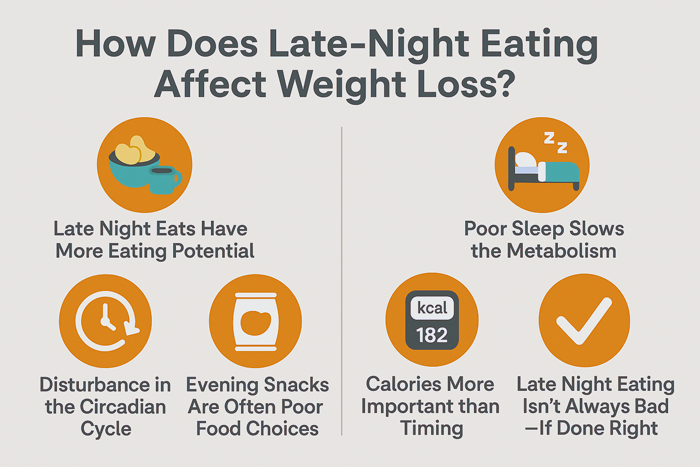It is natural to think about the proposal as to whether one should eat or not eat late at night when somebody is focused on losing weight. The answer to this is not to be completely downplayed, to be sure; nonetheless, the magic key to late-night dieting inclines one toward a much richer discourse.
Let’s get to the pros and cons of such decisions, in short.
-
Late Night Eats Have More Eating Potential
At best, one does not eat late-night meals as a hearty meal. More likely, it’s randomly selected—much more likely than any sort of meal plan. At the end of a long day, seek comfort in food. Overeating becomes easy as a result of excessive consumption of high-quality/high-calorie foods that include chips, sweets, fried stuff, or any refined items.
Tiredness kills your resolve to resist bad ideas; your defense is, therefore, easily overridden. The bottom line is that you are sure to overeat, thereby causing a calorie supply that is way above what is needed to follow a weight-loss endeavor.
-
Poor Sleep Slows the Metabolism
Sleep gets disrupted. In eating at night, your stomach gets full. Digestion gets disturbed by poor sleep. Good sleep is necessary for metabolism so that the body can burn fat.
Research shows that lack of good sleep messes with hormones that control hunger—ghrelin (a hormone that increases appetite) and leptin (a hormone that advertises satiety). Hunger is created in such a way that one who does not get good sleep will eat plentifully the next day.
-
Disturbance in the Circadian Cycle
Twenty-four hours of everybody’s life circadian pattern, from sleep-wake cycle to hormone release and digestive functions. Eating outside hours, like at 1 a.m., will disrupt this rhythm.
If the body clock starts executing out of time, the metabolism might go down, and the metabolism of the body to fast processing of food may fail. This means that fat burning will require more effort, making weight loss more laborious.
-
Calories More Important than Timing
Though late-night eating has affected negative aspects, your main focus still lies on the number of calories you consume. If you take in fewer calories compared to how much you burn in a day, chances are you will lose weight, regardless of the time you eat.
Late-night eating only becomes unpardonable if it results in too much calorie uptake, particularly from nutrient-poor foods. There should be no reason for automatic weight gain if your calorie consumption is within limit and enhanced food choices are made.
-
Evening Snacks Are Often Poor Food Choices
Cravings for late-night snacks are rarely fulfilled with any nutritious meal. At 11 p.m., fruits, vegetables, and lean proteins seem a world away. However, you crave sugar, possibly, or a high-fat but low-nutrient snack.
Also, these choices of food provide nothing in healthy nourishment and promote overeating.
-
Late Night Eating Isn’t Always Bad—If Done Right
One must be aware that not all kinds of late-night eating may be considered as unhealthy, per se. Choice of food and portion control seems to be vital. It all depends on what or how much is being consumed that is either good or bad for your weight loss.
Apart from that, erstwhile studies suggest that eating according to one’s DNA or genetic profile would provide optimal results. It could be that while some can effectively process carbs later during the day, others may see better results from a higher protein intake (in the morning)—based on their genetic make-up.
Recently, various diets based on genetics are available for application; these dietary plans supply detailed advice on mealtime, nutrient intake, or the selection of food.
Contact us for more details about DNA-based diet plans: 099133 30931.


